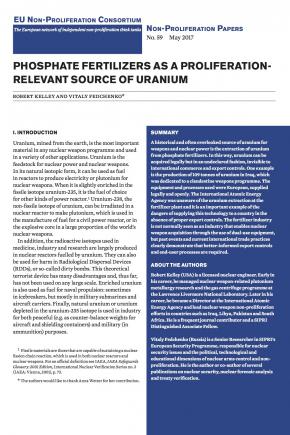Phosphate Fertilizers as a Proliferation-relevant Source of Uranium
A historical and often overlooked source of uranium for weapons and nuclear power is the extraction of uranium from phosphate fertilizers. In this way, uranium can be acquired legally but in an undeclared fashion, invisible to international commerce and export controls. One example is the production of 109 tonnes of uranium in Iraq, which was dedicated to a clandestine weapons programme. The equipment and processes used were European, supplied legally and openly. The International Atomic Energy Agency was unaware of the uranium extraction at the fertilizer plant and it is an important example of the dangers of supplying this technology to a country in the absence of proper export controls. The fertilizer industry is not normally seen as an industry that enables nuclear weapon acquisition through the use of dual-use equipment, but past events and current international trade practices clearly demonstrate that better-informed export controls and end-user processes are required.


